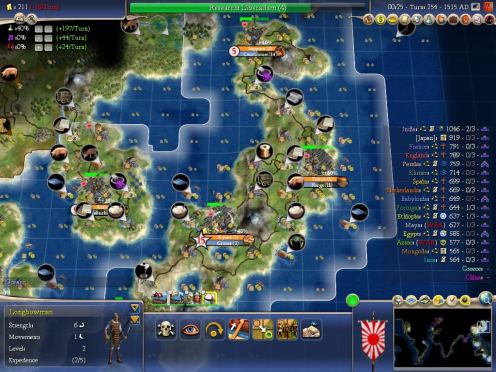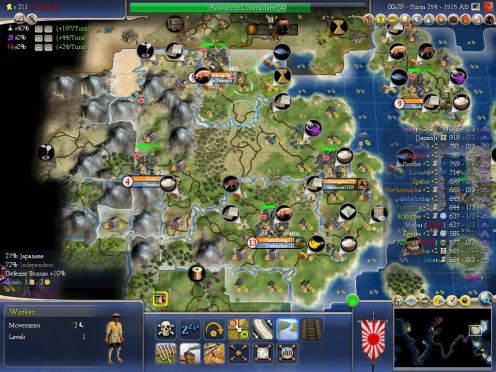On the didactic value of video games, part two
By jeffrud 7 Comments
The last post I did in this series concluded with something of a rant, the point of which was that you can learn from video games if you give it a shot. Yes, these things are crafted first and foremost to be enjoyable, but you can take away quite a bit from some of the more ingenious ones.
Ask most of the people in the know and they’ll agree that if you aren’t gaming on a PC, you’re getting some sort of watered down experience. Games developed for a personal computer are generally more complex as the range of input options is vastly increased over that of a two-handed controller tethered to what amounts to an underpowered computer wired to your television (i.e. a console). A mouse and keyboard are tools near universally understood by now, given that you’re reading this on a computer and your grandmother probably emailed you this morning. Furthermore, the gaming culture stereotype persists that PC gamers are generally more intelligent than console users, who tend to fall into the frat boy, dorm room demographic.
In short, the PC is where it is at, particularly if you’re trying to learn something. I’ll provide two examples, bearing in mind that I’m an East Asian historian.
SHOGUN: TOTAL WAR
(Creative Assembly, 2000)
What a game! I struggle to write objectively about this one as it was probably, more than anything else, the one thing that got me interested in history. To think the game is ten years old now makes me feel pretty old as well. Sigh
Shogun is set during Sengoku Jidai, Japan’s medieval counterpart to the Chinese Warring States period. In the game’s main campaign mode, you select one of several clans vying for control of Japan. You are then left to manage this state, from the ground up. Manage the economy, send diplomatic envoys to rival daimyo, use spies and geishas to gather intelligence, deploy ninjas to conduct assassinations of generals, curb the influence of Portuguese traders spreading Christianity with their guns, conscript armies, and conquer lands through capture of key enemy fortifications. All of this is in your hands.
Two separate interfaces are used to interact with the game’s representation of medieval Japan. The one you’ll spend a lot of time staring at is a beautiful hand-painted map of Japan.
Soldiers are represented in a style vaguely reminiscent of Risk; each is given a token on the board, and armies are assembled by combining units of foot soldiers, archers and horse-mounted warriors into one unit. Spies and watchtowers enable you to see into neighboring territory, so you’ll be aware enough if your neighbor is amassing troops at your doorstep. And inevitably, you will be fighting in this game. Bismarck would have been a big fan of this one, as a lot of blood and iron were involved in my dozens of conquests of Japan.
In spite of notoriously bad strategic AI since the series’ inception, each entry has shined for its continuously improving battle interface. When armies square off, all comparisons with Risk are cast aside in favor of giving you real-time control of your army. Hundreds (thousands, if you had the system to handle it!) of individual soldiers facing off with arrows flying, cavalry seeking to outflank your lines, and a multitude of other tactical decisions to be made on the fly. INTENSE.
As if that weren’t enough, the introductory video contains footage taken from the 1985 Akira Kurosawa masterpiece “Ran,” ninja assassination attempts rewarded you with cinematics that were either kickass (if the attempt succeeded) or hilarious (if it failed), and you could get advice from an old samurai in your own personal frickin’ throneroom. This game had everything. It’s dated to the point of probably having problems with 64bit operating systems, looks like a joke compared to the most modest flash game these days, and is fairly difficult to find (outside of this excellent bundle deal!), but this one still looks great through the rose-tinted shades of memory.
“That’s all great, but what can we learn from this?” Well, how about the frustrations of managing an agricultural-based economy at a period where you constantly need to pool manpower to defend territory from your primary agricultural labor force? Perhaps something about allocating limited resources for development of a small state while ensuring that your army is well fed? The role of subterfuge in statecraft, perhaps in the creation of a dominant historical narrative? Maybe even something about Japanese xenophobia against western nations, via your interactions with Dutch and Portuguese traders? Hell, even in the screenshot above you can learn some geography for free.
“But surely you’re among the minority. I mean, this is just a piece of software, right?” Tell that to the good people at Total War Center, where hundreds of PC nerds work tirelessly researching period histories to craft mods for Shogun and its successors. I’ve been involved in one or two mods for Rome that never came to fruition, and half the reason I left was I couldn’t foot the bill of being a designer/historian. These guys often do both, and they do both exceptionally well, doing a lot to repair buggy AI and otherwise extend the life of these incredible games.
And speaking of incredible games with fanatical fan bases…
CIVILIZATION IV
(Firaxis Games, 2005)

This is an absolute Jesus of a game. I was a latecomer to the Civilization franchise (which has been around since 1990), jumping in at the point when Civilization III was available for about $20 and Civ IV hadn’t been released yet. Even compared to the relatively cerebral fare of the Total War series, there was a fairly steep barrier to entry to Civ III that took me a month or two to overcome. Then I moved to Texas and turned into a rock star blah blah blah and didn’t game that much for a little while.
Civilization IV, which became the game it is today after two large expansions and litany of game balancing patches, refines many of the experiences found in its predecessor and does so with unparalleled panache. Starting a new campaign of Civ IV is like starting a cocaine habit, only you’ve already paid for a lifetime supply of the junk and there’s no nasty nosebleeds (just insomnia-induced headaches). Long-time fans of the series will tell you best that this game is an absolute time sink; I personally had a hard time balancing the second semester of junior year with a particularly engaging game as the Vikings. Days pass by like mere seconds during this game’s high points, and if you don’t believe me, try playing it on a trans-Pacific flight.
“What do you actually do in this game?” You begin as the leader of one of several dozen civilizations (ranging from the Americans to the Koreans, from the Mali Empire to the Aztecs) and are challenged by His Holiness, Sid Meier to build an empire to withstand the tests of time. Your civilization builds cities, gathers scarce resources, researches new technologies (from The Wheel to The Internet and everything in between), conducts diplomacy and trade with neighbors, fields armies to capture resources and crush Montezuma (let’s face it, it’s kill or be killed with that bastard), spread culture, founds religions, and adopts the State Property civic as soon as possible (best civic IMHO). Factor in population control of individual cities, the occasional barbarian invasion, and the prospect of Gandhi with nukes, and you’ve got yourself a real winner here.
Where does learning come? In a word, everywhere. For all practical purposes, every single element of Civ IV is explained in great detail in the Civilopedia, an in-game Wiki that describes everything from the differences between sailing ships to the origins of religions. And that’s only the deliberately-crafted informative portion of the game. This game hammers home lessons about the role of inflation in bringing down governments (as often the most effective means of combating is a revolution and the subsequent turn or two of anarchy), the means by which Europeans came to dominate so much of the last two-hundred years of history (research gunpowder first and you will be in position to steamroll your feudal adversaries), and the extent to which history is built upon control of resources like land, food and (recently) fossil fuels.
I was playing a game using the “Rhys and Fall of Civilization” mod (excellent and distributed with the final build of the game) as Japan a few months ago. After clearing the islands of barbarians and more or less maximizing the use of available land, I began to explore the rest of Asia.
Japan, as you can see (and probably already knew) is not exactly huge, and you eventually will reach a limit of horizontal and vertical growth (i.e. no more food can be milked from the land, no more land to conquer). There are also few natural resources on the island that cannot be obtained elsewhere, and (upon researching the requisite technologies), it becomes apparent that Japan lacks any fossil fuels.
Next door, however, the Korean peninsula is only a stone’s throw away and provides land, resources and (eventually) desperately-needed coal. From there, China’s riches beacon.
I’ve studied World War II in Asia for a few years, done a dearth of reading on the topic, and yet it was Civilization IV, a video game, that helped me more than years of study to understand the motives of the Japanese in their expansion. In a word, economics. The only way to “win” this particular game (beyond peace-mongering means like culture or science) was to expand into China. Here I sat with Japan in the 17th century, building up an invasion force to seize cities on the Chinese coast before they could build up enough strength to counterattack, when suddenly it clicked. “OH,” I said aloud.
“Oh,” indeed. This is only the most profound example on hand; there have been dozens of instances like this one where I’ve come to understand history a little better through this incredible game. I would go so far as to posit the following: you could, with minimal difficulty, incorporate Civilization IV into the classroom as an instructor to demonstrate a few things. Hell, I don’t think it’s that much of a stretch to say that this could easily be made into homework for a social studies course. Go ahead and challenge me on this.
“Alright, so there are a few examples of fairly dense, historically-based games that might have some didactic merit to them. So what? Most people are just going to play Call of Duty anyway, and how are they supposed to learn from that?“. Well, I’ll tell you how. Next time.








Log in to comment